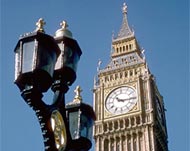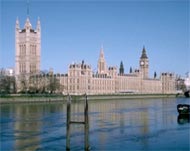Blair policy threatens to blow up
Of all Tony Blair’s pre-election pledges, none was repeated as often as his rallying cry for a new Labour government’s priorities: ‘Education, education, education’.

The sound bite – second in popularity only to ‘tough on crime, tough on the causes of crime’ – was repeated ad infinitum in speeches and party political broadcasts.
It is doubly ironic then, that a parliamentary vote on his government’s education policies on Tuesday could trigger the biggest political tremor of Tony Blair’s seven years in power.
Commentators suggest that his grip on power may be hanging in the balance, for just twenty four hours after an anticipated backbench rebellion, Lord Hutton will publish his long-awaited report into the death of the government scientist, Dr David Kelly.
In public, the prime minister is exuding a glow of confidence and few MP’s openly talk about the possibility of his resignation. Indeed, the government whips have been trying to whittle down the rebellion by portraying it as a vote of confidence in the PM.
Backbench revolt
But a parliamentary defeat for the government on Tuesday could severely undermine Blair’s authority, as the less than ringing endorsement of his leadership from many backbench rebels indicates.
 |
|
The simmering controversy is a |
“I’m not calling for Tony Blair to resign,” the rebel Labour MP Lynne Jones told Aljazeera.net. “As a member of the Labour Party, the last thing I want is for the prime minister to be forced out of office.”
The Birmingham Selly Oak MP added, “I think that it should be for him to decide when it is appropriate to step down, and then the Labour Party can go forward with a new leader.”
Controversial fees
At stake are government plans to extend the ‘variable’ tuition fees system for higher education. This would involve charging students up to £3000 a year, depending on which college they went to, which would then have to be paid back after they graduated.
Inevitably, the proposals have fed a widespread perception that the government is allowing the gap between rich and poor to widen, and eroding the principle that free access to education should be a right.
More than 100 Labour MPs – enough to defeat the government – initially pledged to oppose the bill, but their number has been whittled down by strong arm tactics from the whips.
A total of 81 Labour MPs need to vote with the opposition to defeat the government.
“People tend to get summoned in to see the heavyweights in the government,” Lynne Jones said. “Sometimes Tony Blair or Gordon Brown will have direct talks with them and argue that they should support the government.”
“I think it is unfortunate that some of our colleagues are saying that this is a matter of confidence in Tony Blair as it plays into the whips’ hands and taking the argument away from the real issues.”
Real fears
Opponents of tuition fees say the real issues are the way the plan would triple the cost of going to university for students, and simultaneously create a two tier academic system, with the best courses only available to those who can afford to pay for them.
 |
|
Parliament will vote on the |
“These plans would create a free market in higher education and some students would be priced out of it altogether,” Mandy Telford, the president of the National Union of Students (NUS) told Aljazeera.net.
“Those who go to universities would get hugely in debt and that in turn would impact on their wellbeing and final marks. Students are already working record hours in part-time jobs and the majority who drop out, do so because of debt problems. That would just get worse under the new plans,” she said.
Government conviction
For government supporters though, the issue is one of how to fund an expansion of the higher education system so that it eventually reaches 50% of the eligible population.
Diana Organ, Labour MP for the Forest of Dean, was a backbench rebel on the fees question but two weeks before the vote, she switched sides. She now believes that demanding a contribution from students towards their education is the fairest option because of the higher earnings they will enjoy in the future.
“I was one of the signatories of the early day motion but now I’m almost evangelical in support of these proposals,” she explained to AlJazeera.net, “I wasn’t bullied by the whips.”
“I just went to more debates, had more conversations with people from universities, read David Aaronovitch’s newspaper columns, and talked to more students locally.”
|
“These plans would create a free market in higher education and some students would be priced out of it altogether” Mandy Telford |
As a result of these, she decided that the dustmen among her constituents should not be forced to subsidise the academic costs of trainee doctors.
“In a perfect world, tuition fees could be paid for out of general taxation, but we haven’t got a perfect world,” she said. “We have finite resources and it seems fairer to me that other constituents’ tax money should go to transport, health and primary education, which all affect them directly.”
Some would argue that the dustman might directly benefit from a doctor if he had a heart attack. “Not all graduates become doctors,” Organ countered. “Many become marketing managers. And anyway, not all doctors go on to work in the NHS”
Costly fallout
According to the NUS, in the future, many more students will be forced to choose highly paid careers over publicly-minded vocations, if they know they will have pay off debts of more than £30,000 when they graduate.
Lynne Jones believes that paying for education through a higher tax rate would also make more economic sense. “If you introduced a 50% top rate of tax for people earning over £100,000, you would gain over £4 billion which is far more than could be raised through tuition fees,” she said.
That the new bill is a breach of the Labour Party’s election manifesto goes some way to explaining the scale of backbench opposition to it.
That the government refuses to breach another promise – not to raise the taxes of the wealthy – explains much of the wider antipathy on campus.
On Tuesday, thousands of students will be protesting outside parliament when the MPs discuss the issue. But whatever the outcome, the controversy is unlikely to diminish.
“Even if the government holds the line on Tuesday the fight won’t be over,” Mandy Telford said. “The bill will then go to the committee stage and then to the House of Lords and it will still have to come back to the Commons to gain royal assent.
“This fight is not over until the queen signs the bill. And we will continue to fight it even then.”